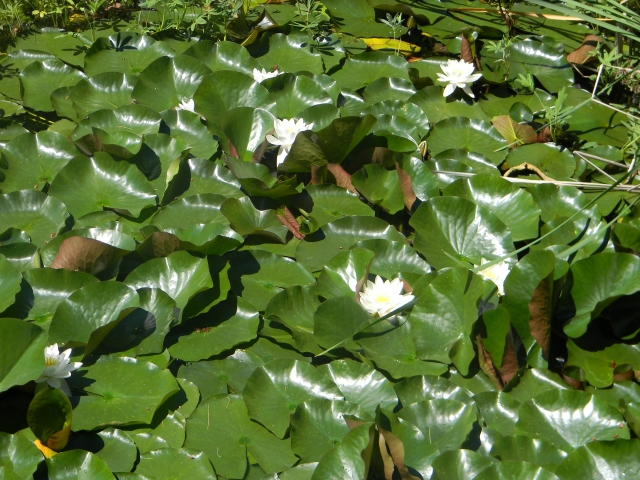Local Invasive Species Society warns Castlegar residents to avoid planting invasive aquatic plants
Thanks to a report from a concerned citizen, the Central Kootenay Invasive Species Society (CKISS) has identified and commenced control efforts on an infestation of invasive fragrant water lily (Nymphaea odorata) in Champion ponds near Castlegar.
CKISS has listed fragrant water lily as a priority action species in the Castlegar region and must be controlled immediately in order to prevent environmental, economic, and social consequences. This introduced aquatic species has unique characteristics that allow it to out-compete native vegetation for space and resources. The plant is easily recognizable, with a large white flower and shiny leaves that float on the surface of the water.
Lakes and ponds are vulnerable to being completely covered by dense patches of fragrant water lily. One plant can easily cover a 15-foot diameter in as little as five years. As a result, biodiversity of the waterbody is reduced and the ecosystem’s health is jeopardized. A fragrant water lily infestation can also lower the value of water front property by restricting lake front access and reducing opportunities for water based recreational activities. Swimmers can be put at risk of drowning if they become entangled in a patch of fragrant water lily.
Yellow flag iris is another high priority invasive species that is found along the edges of Champion ponds and the Arrow Lakes Generating Station wetland restoration sites. It’s an invasive perennial with showy yellow flowers that resembles a common garden iris. It also has negative environmental impacts on wetlands.
How did these plants get here? The horticulture industry has been recognized as a key pathway for the introduction and spread of invasives such as fragrant water lily and yellow flag iris.
“We are encouraging gardening enthusiasts to choose only non-invasive or native species to plant in their back yard water gardens. We hope that people who visit Champion ponds resist the temptation to transplant these flowers,” states Education Program Coordinator Laurie Frankcom. “In addition, we ask that people use responsible steps when disposing of their invasive garden waste. It’s as easy as placing all invasive plant materials in a clear bag and it can be dropped off at your local landfill free of charge. This action can reduce the spread of invasive species.”
The CKISS operational team has been working at Champion ponds to mechanically remove fragrant water lily by digging out the entire plant including the rhizome. In addition the team has been removing yellow flag iris plants from Champion Ponds and the Arrow Lakes Generating Station wetland restoration sites to prevent further spread. CKISS will be monitoring and controlling these two invasive plants in order to protect the areas’ vibrant ecosystem.
The public can report sighting of yellow flag iris and fragrant water lily using any of the following methods:
Log onto the Provincial Report-A-Weed application and follow the steps provided.
Email CKISS or call the CKISS hotline, 1-877-352-1160, for sites located in the Central Kootenay and Kootenay Boundary Area A and B regions.
Call the provincial hotline, 1-888-WEEDSBC, for sites located anywhere in British Columbia.
For more information, contact Laurie Frankcom, Central Kootenay Invasive Species Society, at 844-352-1160 or lfrankcom@ckiss.ca
CKISS is a non-profit society that delivers education and awareness programs, and promotes coordinated management efforts of invasive species in the Regional District of Central Kootenay and Regional District of Kootenay Boundary Area A and B. CKISS acknowledges the support of its funders, including the Columbia Basin Trust, Fish and Wildlife Compensation Program, EcoAction, and Columbia Power.

























